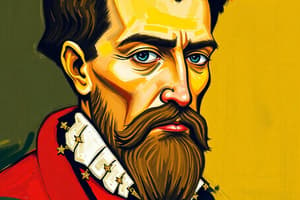Podcast
Questions and Answers
What is the main subject of Niccolò Machiavelli's book 'The Prince'?
What is the main subject of Niccolò Machiavelli's book 'The Prince'?
- The dangers of flattery
- The role of the prince in politics (correct)
- The history of Italian politics
- The art of war
What is the significance of the term 'Machiavellian'?
What is the significance of the term 'Machiavellian'?
- It refers to someone who is diplomatic and tactful
- It refers to someone who is kind and generous
- It refers to someone who is ruthless and cunning (correct)
- It refers to someone who is naive and easily manipulated
What is Machiavelli's advice on being loved or feared as a prince?
What is Machiavelli's advice on being loved or feared as a prince?
- It is equally important to be loved and feared
- It is important to be neither loved nor feared
- It is better to be feared than loved (correct)
- It is better to be loved than feared
What does Machiavelli advise regarding the use of mercenaries and auxiliary forces?
What does Machiavelli advise regarding the use of mercenaries and auxiliary forces?
What is Machiavelli's advice regarding the people's hatred of a prince?
What is Machiavelli's advice regarding the people's hatred of a prince?
What is Machiavelli's advice regarding a prince's word?
What is Machiavelli's advice regarding a prince's word?
What is Machiavelli's advice regarding the use of flatterers?
What is Machiavelli's advice regarding the use of flatterers?
What is Machiavelli's advice on controlling one's fortune?
What is Machiavelli's advice on controlling one's fortune?
What is the main influence of Niccolò Machiavelli's ideas on political leaders throughout the modern West?
What is the main influence of Niccolò Machiavelli's ideas on political leaders throughout the modern West?
Flashcards
The Prince
The Prince
A 16th-century political treatise by Niccolò Machiavelli, offering guidance to new princes and royals on acquiring and maintaining power.
Foresight in leadership
Foresight in leadership
The ability to assess current situations and anticipate future challenges, advising rulers to consider both present and future problems.
Necessary Ruthlessness
Necessary Ruthlessness
Sometimes, it is essential for a ruler to act in ways that are usually considered immoral or ruthless to maintain power and stability.
Civil Principality
Civil Principality
Signup and view all the flashcards
Importance of Military Strength
Importance of Military Strength
Signup and view all the flashcards
Feared vs. Loved
Feared vs. Loved
Signup and view all the flashcards
Deception and Trust
Deception and Trust
Signup and view all the flashcards
Effectual Truth
Effectual Truth
Signup and view all the flashcards
Choosing Sides
Choosing Sides
Signup and view all the flashcards
Study Notes
Summary Title: The Prince by Niccolò Machiavelli
-
The Prince is a 16th-century political treatise written by Italian diplomat and political theorist Niccolò Machiavelli as an instruction guide for new princes and royals.
-
The work was distributed in 1513 and published in 1532 after Machiavelli's death with the permission of the Medici pope Clement VII.
-
The Prince is written in the vernacular Italian rather than Latin, which was increasingly popular at the time.
-
The work is in direct conflict with the dominant Catholic and scholastic doctrines of the time, particularly those concerning politics and ethics.
-
The Prince is remembered as Machiavelli's most notable work and is responsible for bringing the word "Machiavellian" into usage as a pejorative.
-
Machiavelli distinguishes new princedoms from hereditary established princedoms and deals with hereditary princedoms quickly in Chapter 2.
-
Machiavelli advises that a prince should have regard not only for present problems, but also for future ones.
-
Machiavelli advises that it is necessary to do harm to enemies as a necessity.
-
Machiavelli advises that a prince must have the means to force his supporters to keep supporting him even when they start having second thoughts.
-
Machiavelli advises that bringing new benefits to a conquered people will not be enough to cancel the memory of old injuries.
-
Machiavelli advises that a prince should carefully calculate all the wicked deeds he needs to do to secure his power, and then execute them all in one stroke.
-
Machiavelli's advice to take power from people at a stroke is precisely the opposite of what was advised by Aristotle.Summary Title: The Prince by Machiavelli
-
Machiavelli discusses the concept of a "civil principality" where a citizen comes to power by the support of his fellow citizens.
-
He distinguishes two groups present in every city that have different appetites: the "great" and the "people".
-
A prince who obtains power through the support of the nobles has a harder time staying in power than someone who is chosen by the common people.
-
Machiavelli advises against using mercenaries and warns against using auxiliary forces borrowed from an ally.
-
A prince's main focus should be on perfecting the art of war, and he should learn the landscape of his territories.
-
Machiavelli believes that a prince should not shrink from being cruel if it means that it will keep his subjects in line.
-
A prince should guard against the people's hatred and be willing to be more reputed a miser than be hated for being too generous.
-
It is better to be feared than loved, but a prince must ensure that he is not feared to the point of hatred.
-
A prince should only keep his word when it suits his purposes, but do his utmost to maintain the illusion that he does keep his word.
-
Machiavelli advises the ruler to become a "great liar and deceiver" and that men are easy to deceive.
-
A prince should command respect through his conduct and avoid being hated by the commonfolk.
-
Roman emperors had to avoid the hatred of the most powerful, including the military who demanded iniquity against the people out of their own greed.Summary of "The Prince" by Niccolò Machiavelli
-
"The Prince" was written by Niccolò Machiavelli in 1513 and dedicated to Lorenzo di Piero de' Medici.
-
Machiavelli advises princes on how to gain and maintain power, even if it requires immoral and criminal actions.
-
Machiavelli emphasizes the need to look at the "effectual truth" rather than relying on imagined republics and principalities.
-
The book encourages leaders to attempt to control their fortune gloriously and take risks.
-
Machiavelli suggests that a wise prince should have a select group of wise counselors to advise him truthfully on matters.
-
Fortresses in conquered territories, although it sometimes works, often fail.
-
A prince truly earns honor by completing great feats.
-
Machiavelli asserts that it is always wiser to choose a side, rather than to be neutral.
-
Flatterers were seen as a great danger to a prince.
-
Machiavelli argues that fortune is only the judge of half of our actions and that we have control over the other half with "sweat", prudence, and virtue.
-
Machiavelli encourages the Medici family to use what has been summarized in order to conquer Italy using Italian armies.
-
Machiavelli was heavily influenced by classical pre-Christian political philosophy.The Prince: Influence, Interpretation, and Other Works by Machiavelli
Influence:
- Machiavelli's ideas on accruing power had a profound impact on political leaders throughout the modern West.
- Machiavelli came to be associated with Catherine de Medici and the St Bartholomew's Day Massacre in France.
- Catholic writers associated Machiavelli with the Protestants, whereas Protestant authors saw him as Italian and Catholic.
- Machiavelli influenced both Catholic and Protestant kings.
- The Huguenot, Innocent Gentillet, dedicated a work to criticism of Machiavelli, especially The Prince.
- Gentillet accused politicians of treating Machiavelli's works as the "Koran of the courtiers".
- Modern materialist philosophy developed in the 16th, 17th, and 18th centuries, starting in the generations after Machiavelli.
- Machiavelli's realism was noted by many important figures in this endeavor.
- 20th-century Italian-American mobsters were influenced by The Prince.
Interpretation:
- Scholar Garrett Mattingly famously interpreted The Prince as a political satire.
- Some Enlightenment philosophes believed it was a work designed to secretly expose corrupt princely rule.
- Mary Dietz believed Machiavelli's agenda was not to be satirical but was offering carefully crafted advice designed to undo the ruler if taken seriously and followed.
- The Italian Marxist philosopher Antonio Gramsci argued that Machiavelli's audience for this work was not the classes who already rule but the common people themselves.
- Hans Baron argued that Machiavelli must have changed his mind dramatically in favor of free republics after having written The Prince.
Other works by Machiavelli:
- Discourses on Livy
- The Art of War
- The Life of Castruccio Castracani
See also:
- Niccolò Machiavelli
- Political philosophy
References:
- Bireley, Robert (1990). The Counter-Reformation Prince: Anti-Machiavellianism or Catholic Statecraft in Early Modern Europe. University of North Carolina Press. ISBN 978-0807818920.
Additional reading:
- Dietz, Mary (1986). "Trapping the Prince: Machiavelli and the Politics of Deception". The American Political Science Review. 80 (3): 777–799. doi:10.2307/1958288. JSTOR 1958288.
External links:
- The Prince by Niccolò Machiavelli at Project Gutenberg
- The Prince public domain audiobook at LibriVox
- The Prince at SparkNotes
- The Prince at CliffsNotes
- Niccolò Machiavelli at Encyclopædia Britannica
- Works by Niccolò Machiavelli at Project Gutenberg
- Works by or about Niccolò Machiavelli at Internet Archive
- Works by Niccolò Machiavelli at LibriVox (public domain audiobooks)
Studying That Suits You
Use AI to generate personalized quizzes and flashcards to suit your learning preferences.





